Case Study Assignment: Legal Issues under the Corporations Act
VerifiedAdded on 2023/04/03
|6
|1157
|206
Case Study
AI Summary
This case study examines the legal issues surrounding the actions of Gus Gripper, a founding director of Grippero Company, and his potential breaches of the Corporations Act 2001 (Cth). The assignment analyzes Gus's role as a de facto director and the implications of his decisions, including his failure to act diligently, misuse of his position, and involvement in insolvent trading. The study references key sections of the Act, such as sections 180-184 and 588G, detailing the duties of directors, including the business judgment rule, good faith, and the prevention of insolvent trading. The case explores how Gus's actions, such as transferring funds to his own companies while Grippero faced financial difficulties, constitute breaches of these duties. The analysis also considers the responsibilities of the other directors and their potential liability. The conclusion highlights the breaches of the Corporations Act by Gus and the other directors, referencing the cases of ASIC v Adler [2002] and ASIC v Plymin, Elliott & Harrison - [2003] VSC 123 to support the findings.
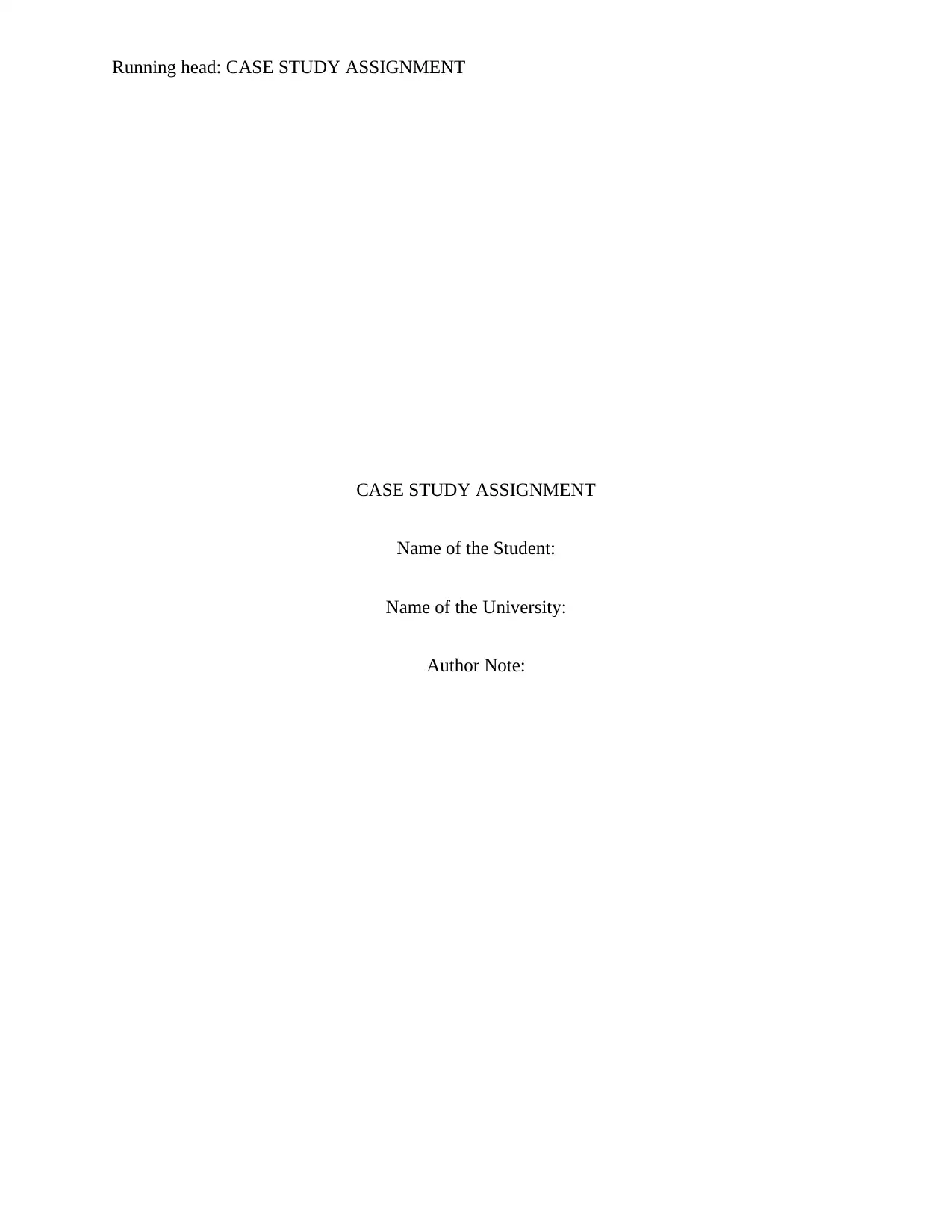
Running head: CASE STUDY ASSIGNMENT
CASE STUDY ASSIGNMENT
Name of the Student:
Name of the University:
Author Note:
CASE STUDY ASSIGNMENT
Name of the Student:
Name of the University:
Author Note:
Paraphrase This Document
Need a fresh take? Get an instant paraphrase of this document with our AI Paraphraser
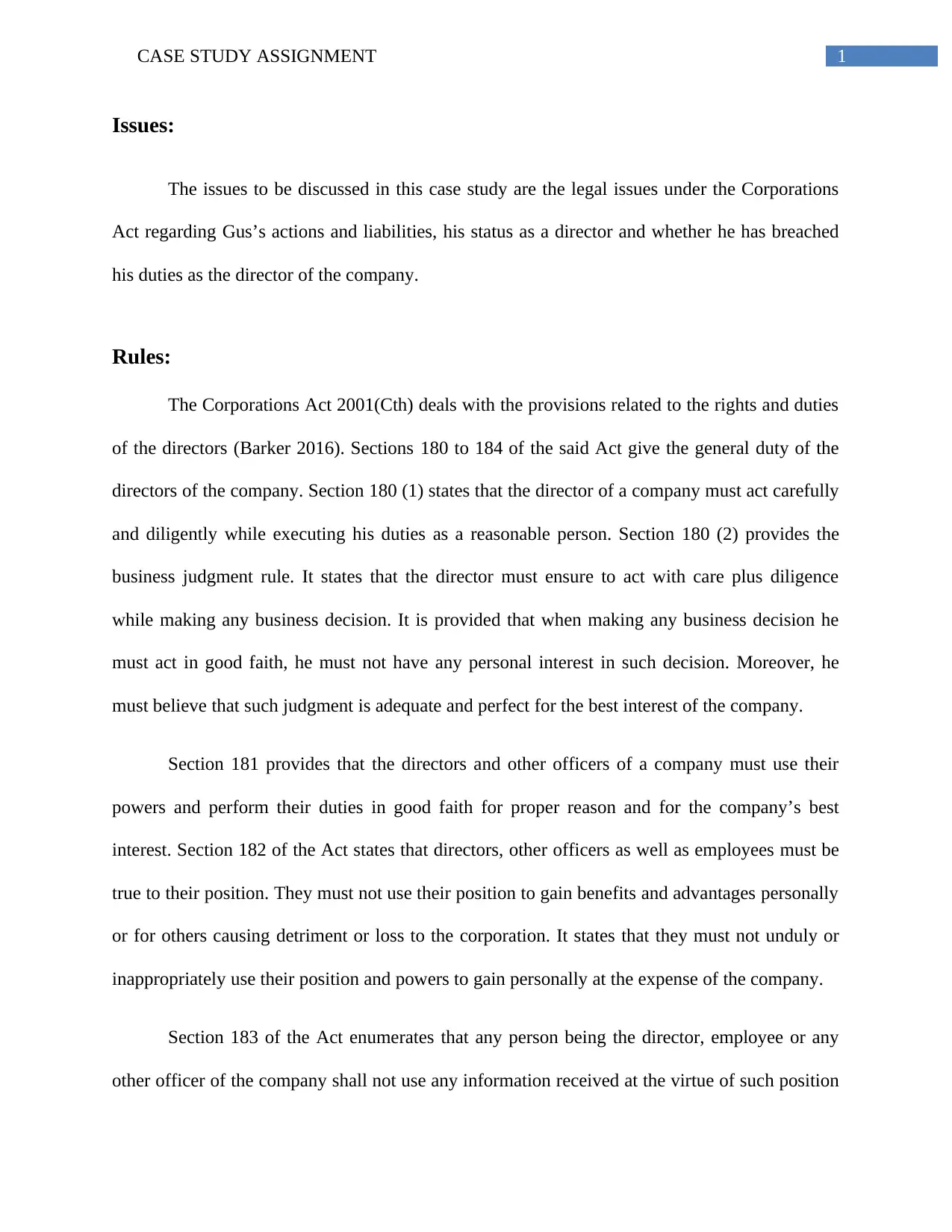
1CASE STUDY ASSIGNMENT
Issues:
The issues to be discussed in this case study are the legal issues under the Corporations
Act regarding Gus’s actions and liabilities, his status as a director and whether he has breached
his duties as the director of the company.
Rules:
The Corporations Act 2001(Cth) deals with the provisions related to the rights and duties
of the directors (Barker 2016). Sections 180 to 184 of the said Act give the general duty of the
directors of the company. Section 180 (1) states that the director of a company must act carefully
and diligently while executing his duties as a reasonable person. Section 180 (2) provides the
business judgment rule. It states that the director must ensure to act with care plus diligence
while making any business decision. It is provided that when making any business decision he
must act in good faith, he must not have any personal interest in such decision. Moreover, he
must believe that such judgment is adequate and perfect for the best interest of the company.
Section 181 provides that the directors and other officers of a company must use their
powers and perform their duties in good faith for proper reason and for the company’s best
interest. Section 182 of the Act states that directors, other officers as well as employees must be
true to their position. They must not use their position to gain benefits and advantages personally
or for others causing detriment or loss to the corporation. It states that they must not unduly or
inappropriately use their position and powers to gain personally at the expense of the company.
Section 183 of the Act enumerates that any person being the director, employee or any
other officer of the company shall not use any information received at the virtue of such position
Issues:
The issues to be discussed in this case study are the legal issues under the Corporations
Act regarding Gus’s actions and liabilities, his status as a director and whether he has breached
his duties as the director of the company.
Rules:
The Corporations Act 2001(Cth) deals with the provisions related to the rights and duties
of the directors (Barker 2016). Sections 180 to 184 of the said Act give the general duty of the
directors of the company. Section 180 (1) states that the director of a company must act carefully
and diligently while executing his duties as a reasonable person. Section 180 (2) provides the
business judgment rule. It states that the director must ensure to act with care plus diligence
while making any business decision. It is provided that when making any business decision he
must act in good faith, he must not have any personal interest in such decision. Moreover, he
must believe that such judgment is adequate and perfect for the best interest of the company.
Section 181 provides that the directors and other officers of a company must use their
powers and perform their duties in good faith for proper reason and for the company’s best
interest. Section 182 of the Act states that directors, other officers as well as employees must be
true to their position. They must not use their position to gain benefits and advantages personally
or for others causing detriment or loss to the corporation. It states that they must not unduly or
inappropriately use their position and powers to gain personally at the expense of the company.
Section 183 of the Act enumerates that any person being the director, employee or any
other officer of the company shall not use any information received at the virtue of such position
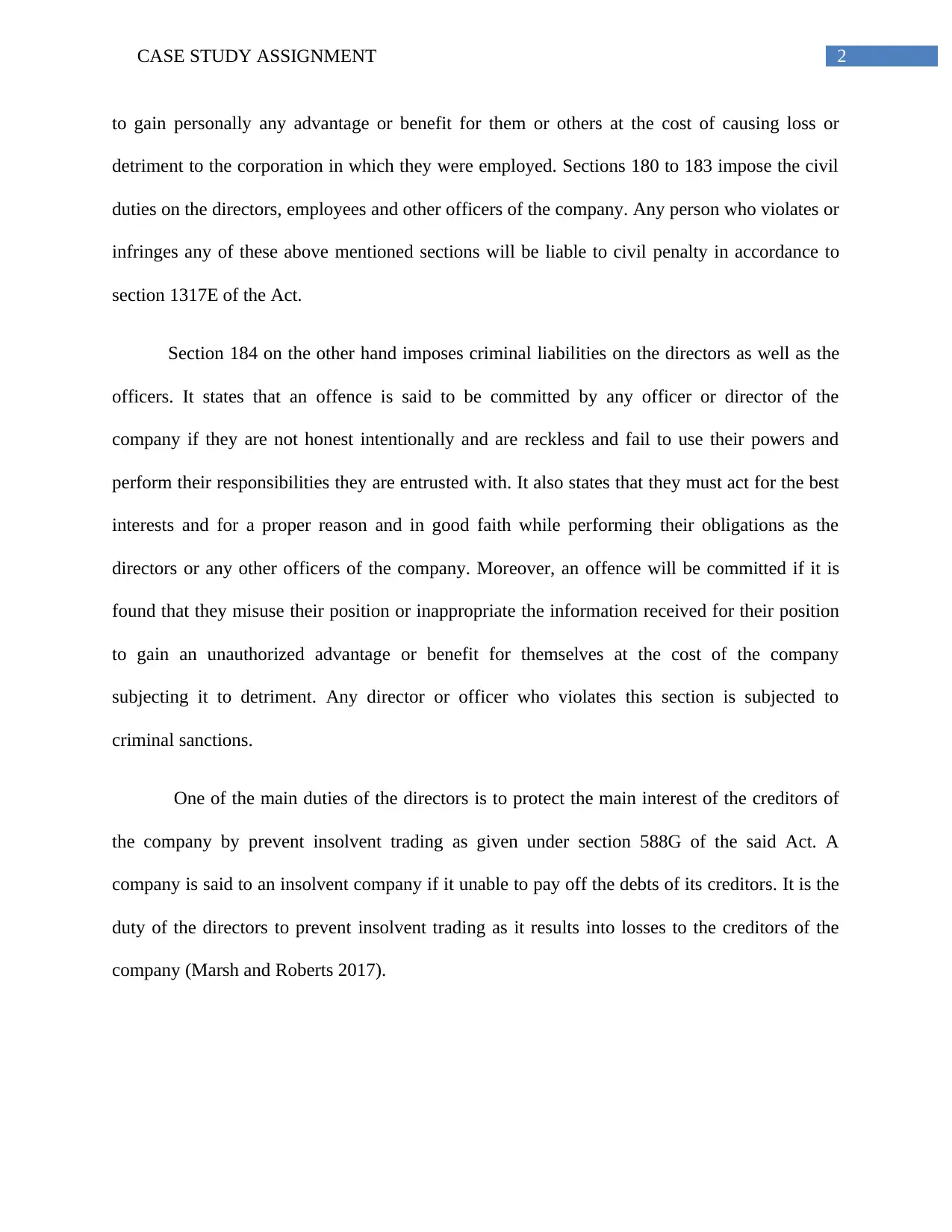
2CASE STUDY ASSIGNMENT
to gain personally any advantage or benefit for them or others at the cost of causing loss or
detriment to the corporation in which they were employed. Sections 180 to 183 impose the civil
duties on the directors, employees and other officers of the company. Any person who violates or
infringes any of these above mentioned sections will be liable to civil penalty in accordance to
section 1317E of the Act.
Section 184 on the other hand imposes criminal liabilities on the directors as well as the
officers. It states that an offence is said to be committed by any officer or director of the
company if they are not honest intentionally and are reckless and fail to use their powers and
perform their responsibilities they are entrusted with. It also states that they must act for the best
interests and for a proper reason and in good faith while performing their obligations as the
directors or any other officers of the company. Moreover, an offence will be committed if it is
found that they misuse their position or inappropriate the information received for their position
to gain an unauthorized advantage or benefit for themselves at the cost of the company
subjecting it to detriment. Any director or officer who violates this section is subjected to
criminal sanctions.
One of the main duties of the directors is to protect the main interest of the creditors of
the company by prevent insolvent trading as given under section 588G of the said Act. A
company is said to an insolvent company if it unable to pay off the debts of its creditors. It is the
duty of the directors to prevent insolvent trading as it results into losses to the creditors of the
company (Marsh and Roberts 2017).
to gain personally any advantage or benefit for them or others at the cost of causing loss or
detriment to the corporation in which they were employed. Sections 180 to 183 impose the civil
duties on the directors, employees and other officers of the company. Any person who violates or
infringes any of these above mentioned sections will be liable to civil penalty in accordance to
section 1317E of the Act.
Section 184 on the other hand imposes criminal liabilities on the directors as well as the
officers. It states that an offence is said to be committed by any officer or director of the
company if they are not honest intentionally and are reckless and fail to use their powers and
perform their responsibilities they are entrusted with. It also states that they must act for the best
interests and for a proper reason and in good faith while performing their obligations as the
directors or any other officers of the company. Moreover, an offence will be committed if it is
found that they misuse their position or inappropriate the information received for their position
to gain an unauthorized advantage or benefit for themselves at the cost of the company
subjecting it to detriment. Any director or officer who violates this section is subjected to
criminal sanctions.
One of the main duties of the directors is to protect the main interest of the creditors of
the company by prevent insolvent trading as given under section 588G of the said Act. A
company is said to an insolvent company if it unable to pay off the debts of its creditors. It is the
duty of the directors to prevent insolvent trading as it results into losses to the creditors of the
company (Marsh and Roberts 2017).
⊘ This is a preview!⊘
Do you want full access?
Subscribe today to unlock all pages.

Trusted by 1+ million students worldwide
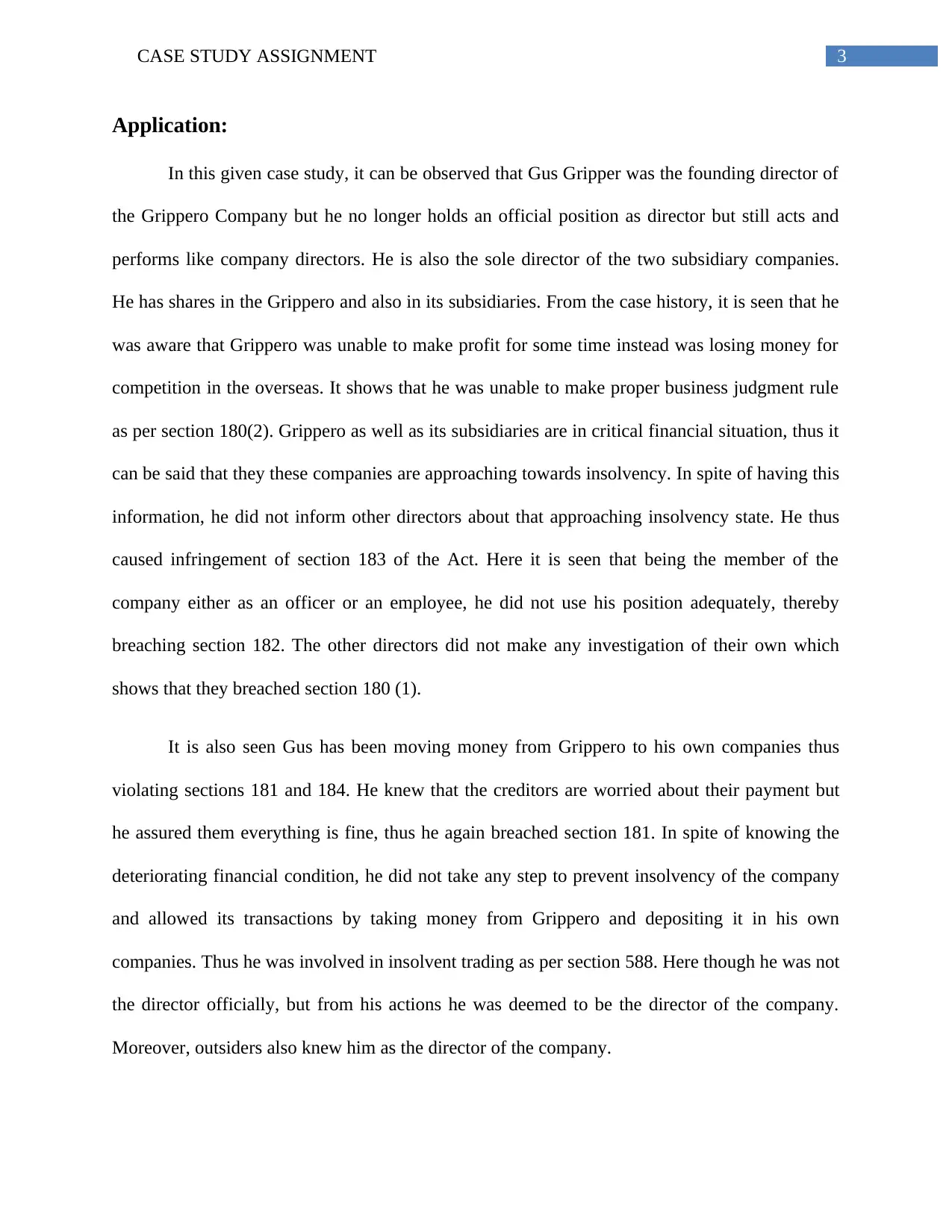
3CASE STUDY ASSIGNMENT
Application:
In this given case study, it can be observed that Gus Gripper was the founding director of
the Grippero Company but he no longer holds an official position as director but still acts and
performs like company directors. He is also the sole director of the two subsidiary companies.
He has shares in the Grippero and also in its subsidiaries. From the case history, it is seen that he
was aware that Grippero was unable to make profit for some time instead was losing money for
competition in the overseas. It shows that he was unable to make proper business judgment rule
as per section 180(2). Grippero as well as its subsidiaries are in critical financial situation, thus it
can be said that they these companies are approaching towards insolvency. In spite of having this
information, he did not inform other directors about that approaching insolvency state. He thus
caused infringement of section 183 of the Act. Here it is seen that being the member of the
company either as an officer or an employee, he did not use his position adequately, thereby
breaching section 182. The other directors did not make any investigation of their own which
shows that they breached section 180 (1).
It is also seen Gus has been moving money from Grippero to his own companies thus
violating sections 181 and 184. He knew that the creditors are worried about their payment but
he assured them everything is fine, thus he again breached section 181. In spite of knowing the
deteriorating financial condition, he did not take any step to prevent insolvency of the company
and allowed its transactions by taking money from Grippero and depositing it in his own
companies. Thus he was involved in insolvent trading as per section 588. Here though he was not
the director officially, but from his actions he was deemed to be the director of the company.
Moreover, outsiders also knew him as the director of the company.
Application:
In this given case study, it can be observed that Gus Gripper was the founding director of
the Grippero Company but he no longer holds an official position as director but still acts and
performs like company directors. He is also the sole director of the two subsidiary companies.
He has shares in the Grippero and also in its subsidiaries. From the case history, it is seen that he
was aware that Grippero was unable to make profit for some time instead was losing money for
competition in the overseas. It shows that he was unable to make proper business judgment rule
as per section 180(2). Grippero as well as its subsidiaries are in critical financial situation, thus it
can be said that they these companies are approaching towards insolvency. In spite of having this
information, he did not inform other directors about that approaching insolvency state. He thus
caused infringement of section 183 of the Act. Here it is seen that being the member of the
company either as an officer or an employee, he did not use his position adequately, thereby
breaching section 182. The other directors did not make any investigation of their own which
shows that they breached section 180 (1).
It is also seen Gus has been moving money from Grippero to his own companies thus
violating sections 181 and 184. He knew that the creditors are worried about their payment but
he assured them everything is fine, thus he again breached section 181. In spite of knowing the
deteriorating financial condition, he did not take any step to prevent insolvency of the company
and allowed its transactions by taking money from Grippero and depositing it in his own
companies. Thus he was involved in insolvent trading as per section 588. Here though he was not
the director officially, but from his actions he was deemed to be the director of the company.
Moreover, outsiders also knew him as the director of the company.
Paraphrase This Document
Need a fresh take? Get an instant paraphrase of this document with our AI Paraphraser
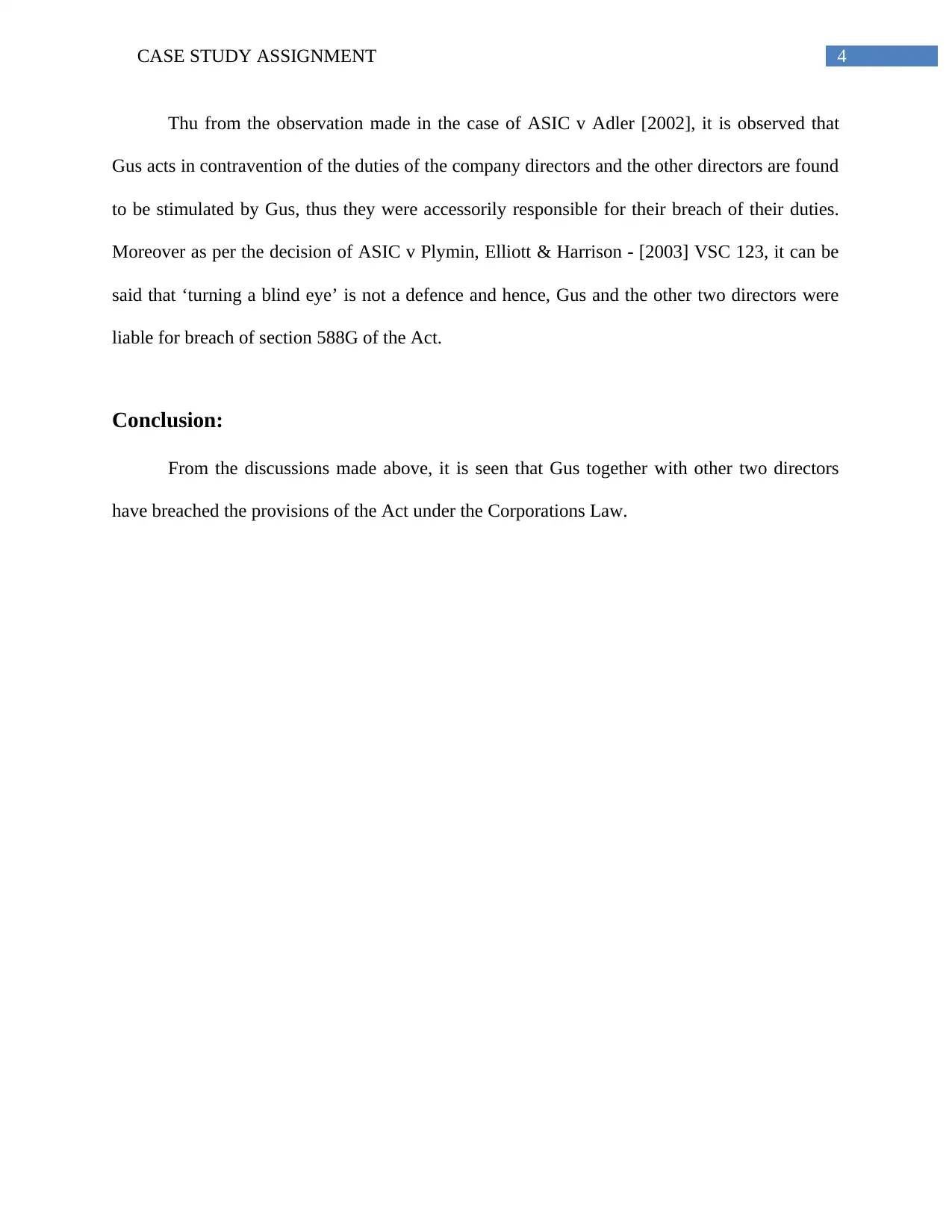
4CASE STUDY ASSIGNMENT
Thu from the observation made in the case of ASIC v Adler [2002], it is observed that
Gus acts in contravention of the duties of the company directors and the other directors are found
to be stimulated by Gus, thus they were accessorily responsible for their breach of their duties.
Moreover as per the decision of ASIC v Plymin, Elliott & Harrison - [2003] VSC 123, it can be
said that ‘turning a blind eye’ is not a defence and hence, Gus and the other two directors were
liable for breach of section 588G of the Act.
Conclusion:
From the discussions made above, it is seen that Gus together with other two directors
have breached the provisions of the Act under the Corporations Law.
Thu from the observation made in the case of ASIC v Adler [2002], it is observed that
Gus acts in contravention of the duties of the company directors and the other directors are found
to be stimulated by Gus, thus they were accessorily responsible for their breach of their duties.
Moreover as per the decision of ASIC v Plymin, Elliott & Harrison - [2003] VSC 123, it can be
said that ‘turning a blind eye’ is not a defence and hence, Gus and the other two directors were
liable for breach of section 588G of the Act.
Conclusion:
From the discussions made above, it is seen that Gus together with other two directors
have breached the provisions of the Act under the Corporations Law.
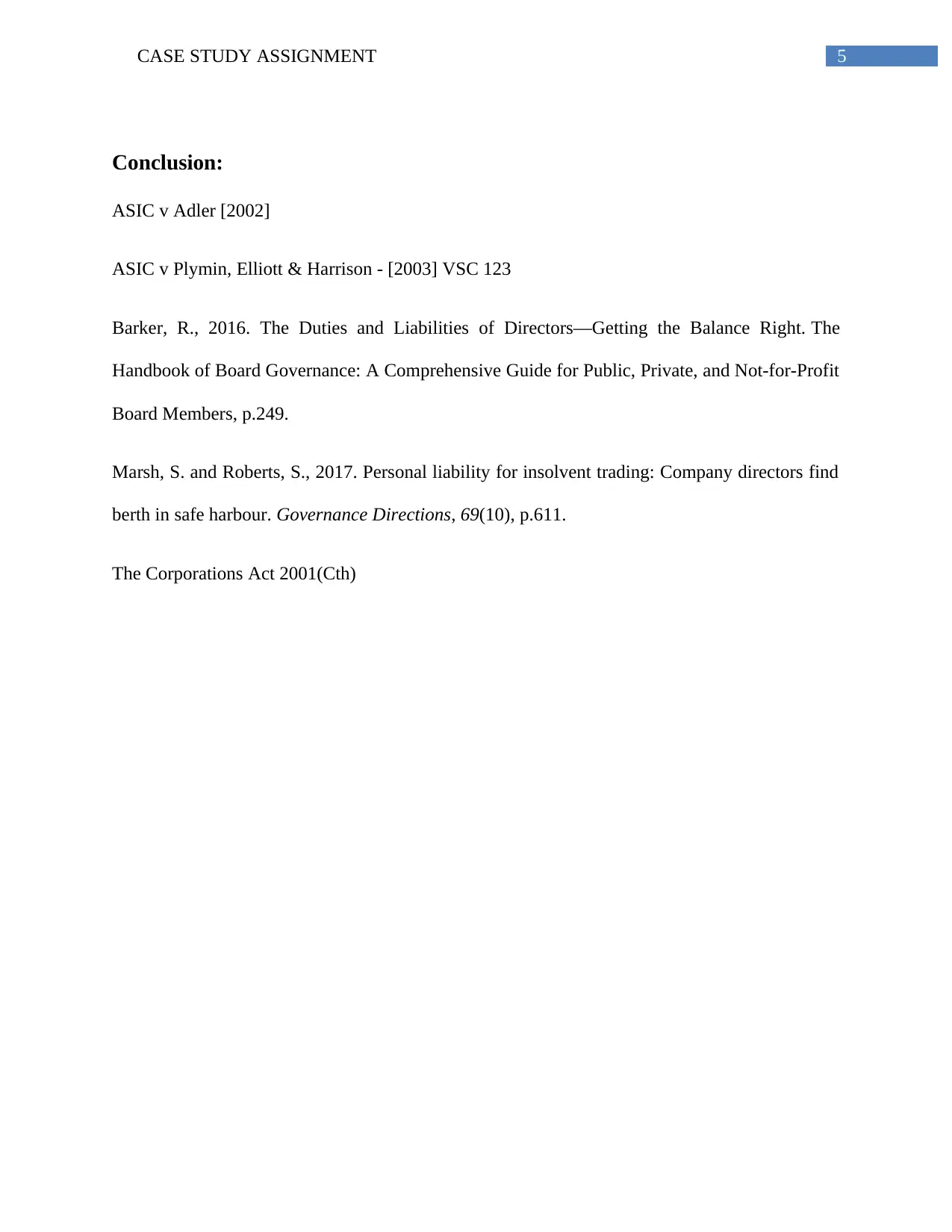
5CASE STUDY ASSIGNMENT
Conclusion:
ASIC v Adler [2002]
ASIC v Plymin, Elliott & Harrison - [2003] VSC 123
Barker, R., 2016. The Duties and Liabilities of Directors—Getting the Balance Right. The
Handbook of Board Governance: A Comprehensive Guide for Public, Private, and Not-for-Profit
Board Members, p.249.
Marsh, S. and Roberts, S., 2017. Personal liability for insolvent trading: Company directors find
berth in safe harbour. Governance Directions, 69(10), p.611.
The Corporations Act 2001(Cth)
Conclusion:
ASIC v Adler [2002]
ASIC v Plymin, Elliott & Harrison - [2003] VSC 123
Barker, R., 2016. The Duties and Liabilities of Directors—Getting the Balance Right. The
Handbook of Board Governance: A Comprehensive Guide for Public, Private, and Not-for-Profit
Board Members, p.249.
Marsh, S. and Roberts, S., 2017. Personal liability for insolvent trading: Company directors find
berth in safe harbour. Governance Directions, 69(10), p.611.
The Corporations Act 2001(Cth)
⊘ This is a preview!⊘
Do you want full access?
Subscribe today to unlock all pages.

Trusted by 1+ million students worldwide
1 out of 6
Related Documents
Your All-in-One AI-Powered Toolkit for Academic Success.
+13062052269
info@desklib.com
Available 24*7 on WhatsApp / Email
![[object Object]](/_next/static/media/star-bottom.7253800d.svg)
Unlock your academic potential
Copyright © 2020–2026 A2Z Services. All Rights Reserved. Developed and managed by ZUCOL.




